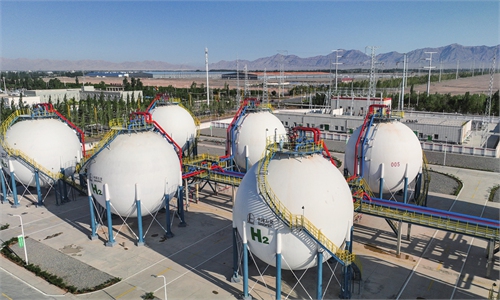
Illustration: Xia Qing/Global Times
Northwest China's Xinjiang Uygur Autonomous Region has emerged as a prominent symbol of China's progress in new-energy development. Its leading position in the new-energy field can offer concrete evidence showcasing China's efforts to maintain stability, promote economic development and enhance people's livelihoods in the region.These tangible achievements speak volumes, countering baseless Western hype over alleged human rights issues.
The installed capacity of new energy in Xinjiang has exceeded 70 million kilowatts (kW), accounting for about half of the region's total installed capacity, the Xinhua News Agency reported on Tuesday, citing data from the State Grid Xinjiang Electric Power Co.
Xinjiang now ranks among the top markets in terms of its installed capacity of new energy and the capacity proportion of new energy. Even on a global scale, these are remarkable signs of progress. Only a handful of European countries, such as Denmark, get 50 percent of their electricity from wind and solar power.
Xinjiang's achievements not only mark a major advance in China's new-energy development but also provide the world, especially Western countries, with valuable experience in green development.
Some American politicians are advised to learn about China's efforts in achieving rapid green growth in Xinjiang, so as to give meaningful consideration to facilitating their country's green development, instead of spreading lies about Xinjiang.
Xinjiang boasts of some of the largest new-energy resources in China. Total reserves of wind energy resources in Xinjiang are estimated at about 890 million kW and the exploitable amount of wind energy resources accounts for 15.4 percent of the country's total.
The exploitable amount of solar energy resources accounts for 40 percent of the country's total, ranking top worldwide, according to local authorities.
In recent years, Xinjiang has capitalized on its natural advantages in energy and other resources, actively promoting the development of renewable energy. This has led to significant progress in adjusting the region's energy structure, with the rapid construction of large-scale wind power and photovoltaic base projects.
Xinjiang has installed 35.68 million kW of wind power and 34.35 million kW of photovoltaic power. Under the 14th Five-Year Plan (2021-25), the region approved 180 gigawatts of new-energy capacity, with installed capacity estimated to exceed 89 million kW by the end of 2024. By then, new energy is expected to become the primary power source in Xinjiang.
Over the years, the rapid development of new energy in Xinjiang has been greatly facilitated by China's policy of boosting development in the country's western region, aiming to bridge the development gap with the eastern region.
It is under the guidance of the central government's policies covering the western region that Xinjiang has increased its investment and support to the new-energy industry, actively driving the transformation and upgrading of the local economy.
Accelerated economic development has also benefited people in Xinjiang, which is conducive to promoting social stability.
Xinjiang's transformation of its resource advantage into economic development advantage has not only ensured electricity supply for the local population, but also boosted local employment.
While promoting the construction of new-energy projects, Xinjiang also prioritizes ecological protection, achieving a harmonious balance between economic development and environmental protection.
The experience of Xinjiang in new-energy policies, investment and infrastructure construction demonstrates that government guidance and support can expedite the growth of the new-energy industry.
As the world strives to achieve green development and address climate change, Xinjiang's example in the area of new-energy development could serve as a valuable reference for other countries, especially those in the West.



